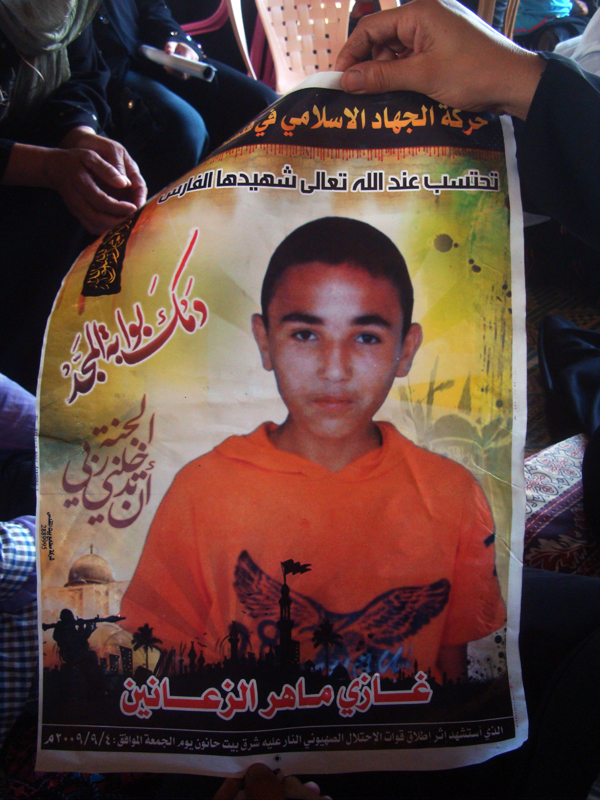28 December 2010 | International Solidarity Movement, Gaza
This morning Mahmoud Mousa Mohammed Al Sirsik, aged 19, was going about his daily business, collecting stones with his horse cart in the border area, east of Gaza City, when Israeli army jeeps entered the area. Seeing the danger approaching, Mahmoud tried to run away, but found himself immobilized as the army trapped him in a rain of bullets to his left and right. One bullet hit a nearby object; a piece of shrapnel bounced back and pierced the young man’s nostril. The injured Mahmoud managed to hide for half-an-hour while the shooting from the jeeps continued and were even reinforced by a tank crossing into Gaza.
“I was sure they were going to arrest me. The tank kept moving in on me– it came as close as 20 meters. At that point I felt I had nothing to lose anymore, so I ran away as fast as I could. Bullets were still passing me by at both sides; it’s impossible to say how many they fired in total,” states an overwhelmed Mahmoud.
One of his relatives interrupts him sternly: “I heard it! It must have been close to a hundred! They wanted to kill him.”
The Al Sarsik family of 16 is dependent on Mahmoud and his brother to provide income by collecting rubble. Terrorized by today’s events, Mahmoud claims he will not take up work as a scrap collector ever again. He hopes to find another job, but it is Gaza’s scarce job opportunities that drive people into despair and force them to take up this kind of hazardous work.
Today’s attack exemplifies yet again Israel’s escalating assault on workers in the border area: since the beginning of November, approximately 40 people have been injured in the buffer zone: the no-go zone as declared by Israeli military that runs along the Gazan side of the border in a swathe 300 to 500 meters wide. However, according to the United Nations, this “high risk” zone stretches up to 1000-1500 meters. The total area amounts to 35% of Gaza’s arable land. According to the Palestinian Center for Human Rights, more than 84 workers have been injured and ten have been killed by the Israeli military since January 2010.
Updated on December 30, 2010
This morning Mahmoud Mousa Mohammed Al Sirsik, aged 19, was going about his daily business, collecting stones with his horse cart in the border area, east of Gaza City, when Israeli army jeeps entered the area. Seeing the danger approaching, Mahmoud tried to run away, but found himself immobilized as the army trapped him in a rain of bullets to his left and right. One bullet hit a nearby object; a piece of shrapnel bounced back and pierced the young man’s nostril. The injured Mahmoud managed to hide for half-an-hour while the shooting from the jeeps continued and were even reinforced by a tank crossing into Gaza.
“I was sure they were going to arrest me. The tank kept moving in on me– it came as close as 20 meters. At that point I felt I had nothing to lose anymore, so I ran away as fast as I could. Bullets were still passing me by at both sides; it’s impossible to say how many they fired in total,” states an overwhelmed Mahmoud.
One of his relatives interrupts him sternly: “I heard it! It must have been close to a hundred! They wanted to kill him.”
The Al Sarsik family of 16 is dependent on Mahmoud and his brother to provide income by collecting rubble. Terrorized by today’s events, Mahmoud claims he will not take up work as a scrap collector ever again. He hopes to find another job, but it is Gaza’s scarce job opportunities that drive people into despair and force them to take up this kind of hazardous work.
Today’s attack exemplifies yet again Israel’s escalating assault on workers in the border area: since the beginning of November, approximately 40 people have been injured in the buffer zone: the no-go zone as declared by Israeli military that runs along the Gazan side of the border in a swathe 300 to 500 meters wide. However, according to the United Nations, this “high risk” zone stretches up to 1000-1500 meters. The total area amounts to 35% of Gaza’s arable land. According to the Palestinian Center for Human Rights, more than 84 workers have been injured and ten have been killed by the Israeli military since January 2010.




